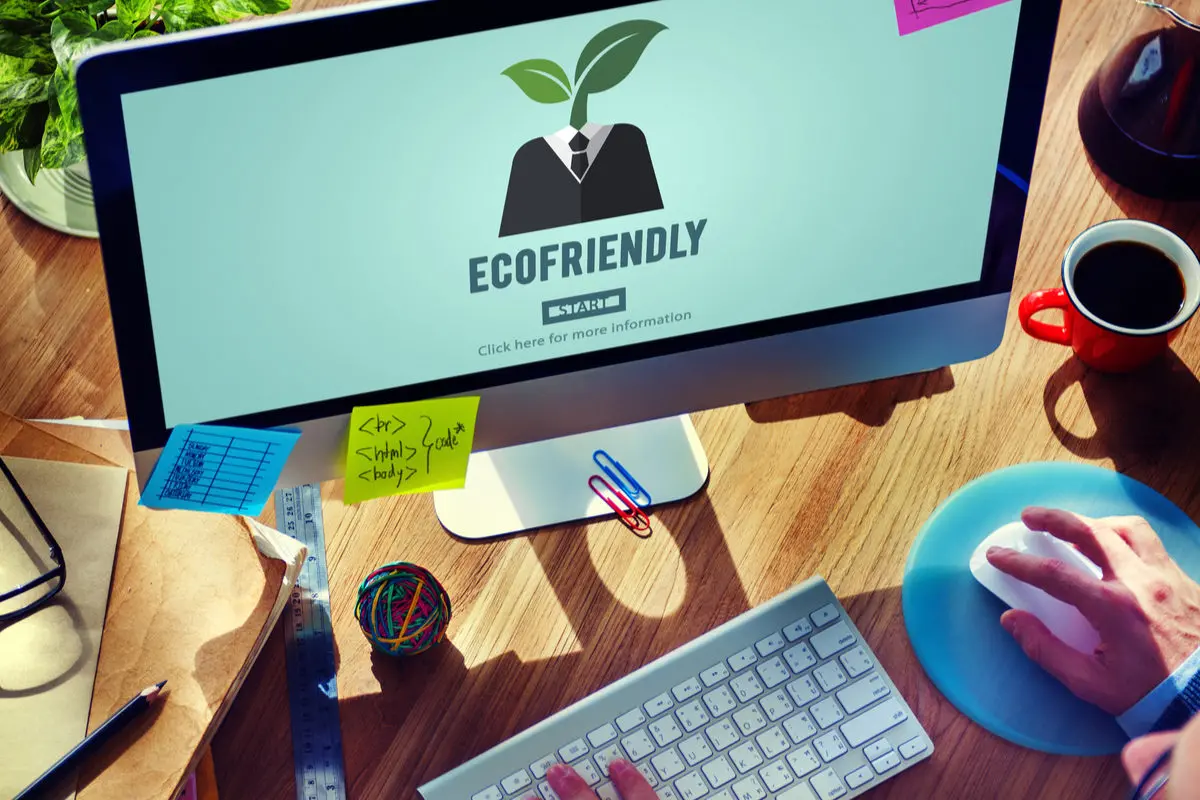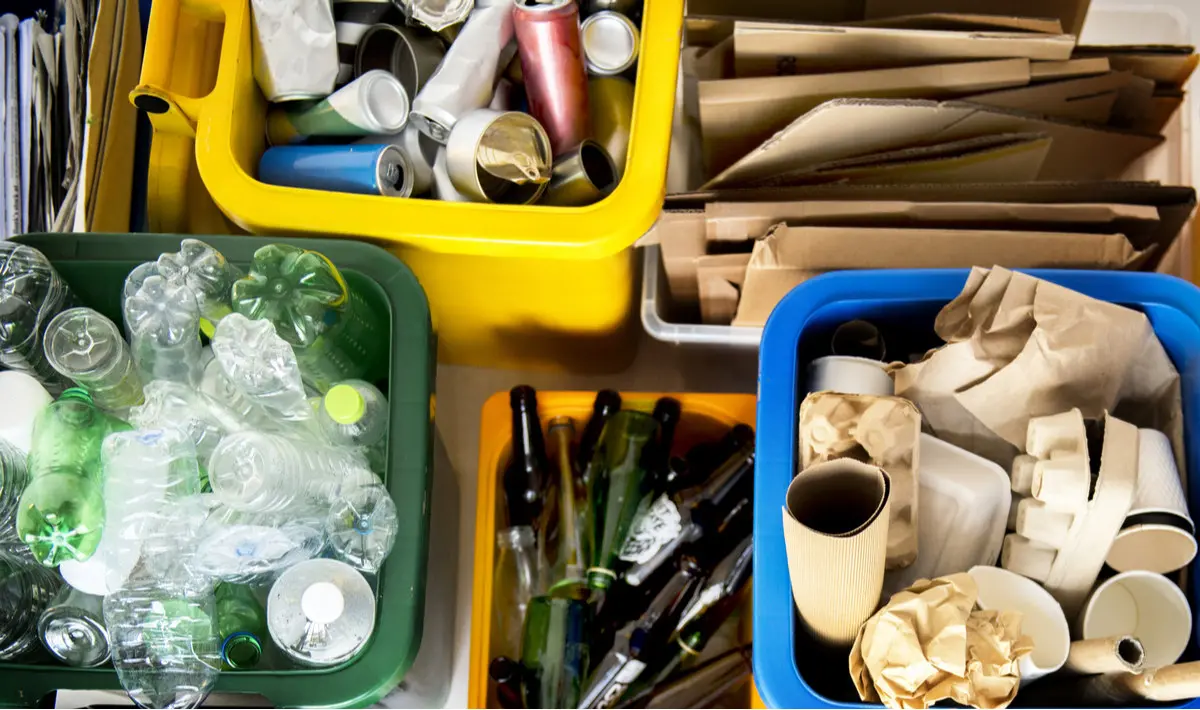Table of Contents
- How to Make Your Retail Business Eco-Friendly
- Encourage Using Reusable Water Containers
- Switch to LED or CFL Lights
- Go Digital and Paperless
- Have Awareness Events
- Recycle Your Waste
- Stock Up the Office with Organic Food
- Use Eco-Friendly Supplies
- Turn Everything Off
- What Are Other Businesses Doing Right Now?
- Top 10 Eco-Friendly Businesses
- How to Save Money With Your Eco-Friendly Business?
Thirty percent of Earth’s total waste comes from the United States, and 20.4% of that waste is made up of goods thrown out by businesses. As Earth Day approaches, let’s protect our planet from damage caused by human activities. Here are some tips on how to adopt cost-efficient and eco-friendly ideas for your business. An eco-friendly business uses recycling, energy conservation, and energy-saving equipment to minimize harm to the Earth.
How to Make Your Retail Business Eco-Friendly

Here are eight smart ways to make your company greener.
Encourage Using Reusable Water Containers
Sixty million plastic water bottles end up in landfills or on the streets and in waterways every year. As a company, if you encourage the use of reusable water bottles, it could keep lots of plastic out of the environment.
However, if your company does provide water bottles, it is important to encourage the use of recyclable bins. Only 12% are recycled each year currently.
Switch to LED or CFL Lights
Incandescent light bulbs are known to use a lot of energy. They only turn 10% of their energy to light. The rest is released as heat. Aspiring eco-friendly retailers should consider switching to a light-emitting diode bulb, also known as LED lights. These convert 95% of their consumed energy into light and only 5% into heat.
There are also CFLs, which are compact fluorescent tubes. These are very similar to LEDs, but are less effective and generally do not last as long as LEDs.
Using these light sources requires less energy from power plants, meaning fewer greenhouse gases are emitted into the atmosphere. Additionally, it is helpful to install sensor lights in your office. Not only will this be cost-effective, but it will also be eco-friendly.
Go Digital and Paperless
Around one billion trees worth of paper are thrown away each year. Fortunately, going paperless has become a normalized thing in the past couple of years. Bank statements, receipts, and documents have gone digital.
An eco-friendly business can send receipts digitally to phone numbers or email addresses instead of printing them. For consumers that feel uncomfortable giving that information away, you can offer a paper receipt to them just in case.
Another eco-friendly idea is to use recycled paper products such as hangtags, bags, and receipt paper. This can be more expensive than the regular product but will go a long way in saving the environment.
Have Awareness Events
As a team, your company can host environmental-friendly awareness events. Here is what a seven-week plan could look like:
- Week 1: Water Week – Drink filtered tap water instead of bottled water this week.
- Week 2: Eat Greener – Eat organic foods farmed and grown with no preservatives or added chemicals.
- Week 3: Community Service Week – Volunteer to clean up a beach or a park. Employees who participate in this activity can be entered into a raffle for an electronic gift card to a local eco-friendly business.
- Week 4: Turn Off the Lights – Turn off the lights and open the blinds for natural light.
- Week 5: Earth Day 5k Run – Run for a cause and help raise money to save the Earth.
- Week 6: Listen to a Lecture on Zero Waste – Host a lecture on how to achieve zero waste. Invite your clients to listen in.
- Week 7: Organic Dinner Party – Have a dinner party at a local eco-friendly restaurant.
Recycle Your Waste

As a greener business, it is helpful to recycle your waste. This helps conserve energy, reduces air and water pollution, and lowers greenhouse emissions. Recycling helps reduce the amount of waste that is sent to landfills. These waste materials can also create reusable and recycled materials so it is important as an eco-friendly business to do this.
Stock Up the Office with Organic Food
Organic foods are those that have been grown and farmed without the use of pesticides, hormones, and artificial chemicals. A requirement to be labeled as organic is that the item must not have artificial food additives. This is not only a healthier way to eat, but also an eco-friendly method. These harmful chemicals, preservatives, and additives are not emitted into the air while farming organic foods.
Use Eco-Friendly Supplies
Supplying the office with eco-friendly products can help the environment. Some of these items include:
- Rechargeable lithium-ion batteries
- Bamboo forks, spoons, and knives
- Metal or glass straws
- 100% recycled notes
- Recycled tissues and paper towels
- Recycled trash bins
- Adding plants such as terrariums
- Plantable pencils and pens
- Compostable notebooks and paper
- Recycled binders
- Organic soaps and lotions
Turn Everything Off
Turning off all electronic equipment and lights at the end of the workday can help your company become a greener business.
You can send out daily reminders from a group calendar to shut down computers at 4:55 p.m. Similarly, a reminder to turn off lights is important, too, unless you have sensor lights.
What Are Other Businesses Doing Right Now?

Any business can go eco-friendly with enough determination and resources. Using eco-friendly products and converting your office space can be costly but may save you money in the long run.
Here are some businesses and their eco-friendly ideas:
- Eco-Friendly Clothing Stores – Use digital receipts, recyclable paper bags, and organic materials to make clothing
- Eco-Friendly Furniture Companies: Turn off all electrical devices and lights at the end of the workday, use recyclable materials to ship items, reduce packaging by offering a later delivery option to package all items and goods together, and create recycling policies
- Grocery/Market Eco Businesses – Eliminate plastic bags and charge for paper bags, offer cents off for bridging a reusable bag, and use air dryers instead of paper towels to reduce waste
Top 10 Eco-Friendly Businesses
- Patagonia is a well-known clothing company known for being one of the top eco-friendly companies in the U.S. They have been eco-friendly activists since the start of their company in 1973 in Ventura, California. Patagonia has taken initiatives and action to reduce the company’s environmental impact. To do this, they use recyclable fabrics to create their clothing and offer a repair and reuse program where consumers can bring Patagonia clothing that is damaged.
- Numi is an organic tea company that focuses on creating plant-based tea wrappers to reduce the reliance on fossil fuels. Recently, the company launched its green business plan for plant-based packaging. They use 90% post-consumer wastepaper cartons, soy-based inks, and biodegradable Manila hemp tea bags in their packaging.
- Beyond Meat is an eco-friendly business that makes meat alternatives such as plant-based meat. The meat alternatives, such as pea protein, are made from a variety of products such as plant-based protein, fats, and minerals. The company uses 99% less water, 93% less land, 90% fewer greenhouse gases, and 46% less energy than a traditional beef burger. By creating these meats, they save the Earth’s resources by cutting their carbon footprint by half.
- Pela creates everyday products such as phone cases and sunglasses using plant-based biopolymer, recycled materials, and flax straw fibre which is a waste byproduct of the oilseed harvest. These products are tested for BPA and do not contain lead, cadmium, or phthalates. Pela also donates one percent of all its revenue to other eco-friendly companies and nonprofits.
- Yes Straws is a green business that sells biodegradable natural straws made out of cane and wheat stems. This is done to replace the use of harmful plastic products in their merchandise. Most plastic straws do not make it completely through a mechanical recycling sorter, so it ends up getting disposed of as garbage and in our oceans. Yes Straws uses renewable feedstock such as starch and natural fibres instead of petroleum-based feedstock to reduce the amount of greenhouse gases that are emitted. The company believes that it is important to use biodegradable and compostable alternatives because single-use plastics turn into microplastics that hurt wildlife and marine life. By using compostable materials, they are helping reduce landfill waste.
- A Good Company is an eco-friendly e-commerce company that exists to create sustainable products. A variety of their products use recyclable and organic materials such as recycled polyester and sugarcane. The company posts on their website about what materials they use and how it affects and impacts the environment which helps educate consumers on how they are helping by purchasing A Good Company’s products.
- Dr. Bronner’s is a natural soap brand that is biodegradable. The company’s mission is to send less waste to the landfill and release fewer greenhouse gases into the environment. Their products are natural, vegan, and organic and put into 100% post-consumer recycled bottles. Dr. Bronner’s is committed to becoming a zero-waste company and aims towards reaching that goal each day. It is in compliance with the USDA National Organic Program (NOP) and ensures that the products consumers purchase from them are made from organic ingredients.
- Native Shoes is an environmentally friendly shoe company produced entirely from plant-based and animal-free products. This company uses ingredients such as linen and pineapple leaf fibers to make its products. Each pair of shoes is one hundred percent recycled. Native Shoes launched a 100% compostable and plant-based sneaker recently and plans to become 100% lifecycle managed by 2023.
- Seventh Generation is a green business that aims to sell green home products such as detergents, cleaning, and hygienic products. The company uses sustainable, plant-based, and recyclable ingredients and materials to package its products.
- Bambu aims to sell sustainable home goods and eco-friendly dinnerware. It teaches consumers about the dangers of using plastic and other harmful materials. The company uses materials that are grown without pesticides and fertilizers. These products are also biodegradable, compostable, and food safe tested and approved.
These companies have launched initiates, policies, and campaigns to be proactive in the eco-friendly community. Not only are these companies contributing to zero waste, but they are also teaching consumers to be mindful of the impact of climate change on business corporations. As a collaborative effort, eco-friendly companies work to eliminate harmful ingredients from their products and aim to use biodegradable and compostable components instead. By purchasing from these environmentally friendly businesses, buyers are also aiding and contributing to saving the Earth. As awareness spreads, more companies, individuals, and consumers will be more conscious and aware of their polluting habits.
How to Save Money With Your Eco-Friendly Business?
The best way to save money with any business is to have all employees work from home. Working from home limits the number of resources it takes to leave your office up and running. This also saves your company money on rent and other expenses.
Your employees do not have to drive to work and release gas emissions and pollution into the atmosphere. Additionally, your employees will not use as much paper and plastic, which means less waste will be sent to landfills.
Table of Contents
- How to Make Your Retail Business Eco-Friendly
- Encourage Using Reusable Water Containers
- Switch to LED or CFL Lights
- Go Digital and Paperless
- Have Awareness Events
- Recycle Your Waste
- Stock Up the Office with Organic Food
- Use Eco-Friendly Supplies
- Turn Everything Off
- What Are Other Businesses Doing Right Now?
- Top 10 Eco-Friendly Businesses
- How to Save Money With Your Eco-Friendly Business?


